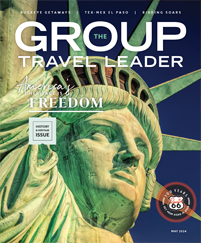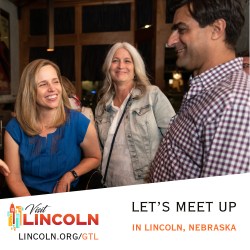Feeling the smooth stone of the Taj Mahal or stepping on the isolated continent of Antarctica may seem like impossible dreams for many travelers. But these types of exotic experiences consistently show up on people’s travel wish lists.
For group leaders, unfamiliar international destinations like India, Antarctica, the Galapagos Islands and Thailand might feel impractical both in the logistics and in the realities of convincing their members to go. But dismissing these dreams out of hand is a mistake. As tour operators like Collette can attest, many travelers will find the money to go to these once-in-a-lifetime countries with the proper inducements.
“There are a lot of people who want to go to exotic destinations but won’t go on their own,” said Elizabeth Simmons, vice president of sales for Collette. “So what better opportunity for group business than to give travelers the opportunity to go to that dream destination?”
Of course, exotic travel is relative. Italy may offer all of the culture shock that some inexperienced travelers can handle, while others long to interact with the Maasai tribe of Kenya. But after a group leader discovers which places will most tempt members, it should be remembered that the destination isn’t outside the realm of possibility with the correct preparation.
Step One: Find a Partner
The intricacies involved in sending a group of 30 to Thailand could seem infinitely challenging for group leaders until they partner with tour operators that have cultivated a familiarity with the country’s every oddity. Trusted tour operators such as Collette, Abercrombie and Kent, and Intrepid Travel don’t view Thailand as difficult. They’ve each been sending groups to foreign locales for 25 years or more.
“It comes down to picking an operator that has the experience, safety standards and value of customer service,” said Connor Frey, private groups manager at Intrepid Travel in North America. “We travel to these exotic places on a regular basis. We can let travelers know that traveling to that destination is not as difficult as it may sound, because this is what we do day in and out.”
Instead of creating something from scratch, these operators can rely on well-tested tours that groups can choose off the rack or use as a starting point for a customized experience. Rather than fret over how to move their group from one remote Nepal village to another, travel planners can rely on the expertise of these companies, who’ve already solved the daunting parts of exotic travel.
Group leaders can also feel reassured that these tour operators don’t consist of just a single office, but rather, they tap into a network of experts around the world.
“We have staff on the ground in the destination, as well as here in the U.S.,” said D. Shawn Johnson, director of national account sales at Abercrombie and Kent USA. “I like to call that globally local. We have people on the ground who are able to know the culture and know what is unique to that destination.
“Most places others might think of as exotic we’ve been servicing for nearly a decade this way.”
Step Two: Preserve Western Comforts
Americans thrown into a totally alien culture can feel disoriented, especially if they start to consider the state of the local hotels or the cleanliness of the food. The concern of discomfort can turn many away from exotic destinations before they even consider them.
Well-planned group travel to these destinations always makes travelers feel immersed in the local culture by day but returns them to a sense of familiarity with Western-standard accommodations by night. Group leaders can easily accomplish this by booking a cruise that specializes in both culturally fascinating ports and luxury, such as Crystal Cruises.
“I always tell a group that the vessel becomes their home away from home,” said Jerilyn Giacone, manager of corporate meetings, incentives and strategic alliances for Crystal Cruises. “We can take them to these exotic locations, which sometimes don’t even have a hotel there, such as Antarctica. At the end of a day of touring, the group comes back to the vessel and they are surrounded by things familiar to them.”
With a cruise, guests can visit Third World countries but feel assured that they will start the day with a hot shower, clean drinking water and other Western amenities a ship can provide.
However, since it’s not always possible to take a cruise to reach numerous dream destinations, land tour operators also ensure Western-style amenities for a smooth transition into a foreign location.
“Most people are fine going out and seeing a destination as long as they can have comfort when they come back at night,” said Simmons of Collette. “In India, there are a range of one- to five-star hotels. In exotic destinations, we only stay in the best hotels in that area. So travelers still have the Western comforts they expect.”
Many operators also consider mealtimes crucial for retaining Western standards. Instead of sending travelers to eat street food in a Third World country, the itinerary will give them a choice of sanctioned restaurants. For those finicky about trying odd local favorites, operators also try to provide a Western option.
For example, in Collette’s trips to Australia, participants can choose between a chicken and a kangaroo dish, so those wishing to eat adventurously can and those a little more wary can stick to the conventional fare.
Group leaders should communicate with their members to dispel the myth that their travelers will endure rough living standards in these far-off places. Details like Abercrombie and Kent’s VIP lounge in the Galapagos airport paint a more enticing picture of the trip than potential participants might now envision.
“There are hotels more geared toward local travelers, but we use ones more geared toward Western travelers,” said Johnson of Abercrombie and Kent. “There is already a U.S. converter built right into the wall for a lot of the hotels we use.”
Step Three: Combat Concerns With Information
For many people, preconceived ideas about the dangers or hassles of international travel often stop them from booking their dream trip before they learn anything else. Sometimes, just the distance and flight time alone can be the determining factor.
“It could be the flight. It could be the food. It could be a lot of different things,” said Simmons. “Whatever the fear is, it’s just a matter of talking through it. Flight times are usually a concern. We always offer prenights or break up longer-haul travel to get adjusted to that region.”
Group leaders should always check the routes involved before dismissing a destination, since tour companies try to make the route as comfortable as possible.
Safety concerns can often prove harder to combat, which is why group leaders should first express their concerns with a tour operator before marketing the trip to their members.
“We invest a lot in travel education, so our team can speak in first person on what it’s like to sleep in a place like Kenya or answer other questions,” said Johnson. “I think most of the time, people’s fears and images of a place are not grounded in reality. A recent example was the Ebola epidemic. I talked to a lot of people delaying or canceling their plans for safaris in South Africa. There hadn’t been a single documented case of Ebola in any of the places where tourists safari. It was the distance of Chicago to Los Angeles. But if there was an outbreak of something in Chicago, you wouldn’t cancel your plans to go to Los Angeles.”
Operators will help inform both group leaders and members with educational documents and firsthand accounts of local conditions. These companies know the frequently asked questions about transportation from the airport from the hotel, special vaccinations needed and other topics, so they can answer them up front to take some of the stress out of these exotic locales.
“I think managing a group’s expectations is the most important thing,” said Frey of Intrepid Travel. “We have an option where travelers can hop on a conference call with us and we’ll connect them with someone who’s on the ground at the destination. That’s an impressive resource to have in your back pocket. Group leaders should keep the group informed and comfortable before the trip. Once they arrive, we can take it from there.”
Travel professionals will monitor a group’s safety as the tour progresses. If danger of any kind is suspected, these companies always have an exit plan.
“We are always in touch with the conditions of the local area,” said Giacone of Crystal Cruises. “We can change our direction or course, whereas a hotel can’t. We did have a situation where our ships were using a port, and we were able to redeploy and provide with a safer location. Safety and security are always first in our mind.”
Step Four: Sell the Dream
Though selling the idea of an unfamiliar destination invites certain challenges, it also boasts some impressive advantages. Potential travelers can easily appreciate the thrill of walking next to Thailand’s ancient temples or looking into the eyes of a giant tortoise in the Galapagos Islands. Group leaders don’t have to worry about the appeal of these types of culturally enriching experiences.
Instead, they should concentrate on why these bucket-list locations are worth the extra money and time because of the once-in-a-lifetime payoff.
Travel planners can take this a step further by offering experiences unavailable to individuals. Crystal Cruises has developed these types of exclusive experiences on its luxury ships, among them the Crystal Esprit, a 62-person yacht that can reach smaller ports.
“We can offer experiences that group members would not be able to get on their own, such as a behind-the-scenes tour of a UNESCO site,” said Giacone. “Crystal Mozart, our gorgeous river vessel, has a signature event at the Belvedere Palace. There is champagne on arrival and a beautiful classical concert featuring the music of Austria. That becomes a marketing hot button.”
Other than focusing on the unforgettable travel memories possible on these types of trips, group leaders can also take advantage of tour operators’ resources to help advertise their trips. These companies already have a wealth of media, videos and other tools at their disposal.
“The biggest thing to market to your group is the tour company’s expertise,” said Frey. “You can go to your group and say, ‘Here is an operator that has gone to this place for 30 years. Here are some reviews.’”
With the combination of the travel professional’s knowledge and the exceptional natures of the trips themselves, dream destinations can become reality for travel lovers everywhere.










